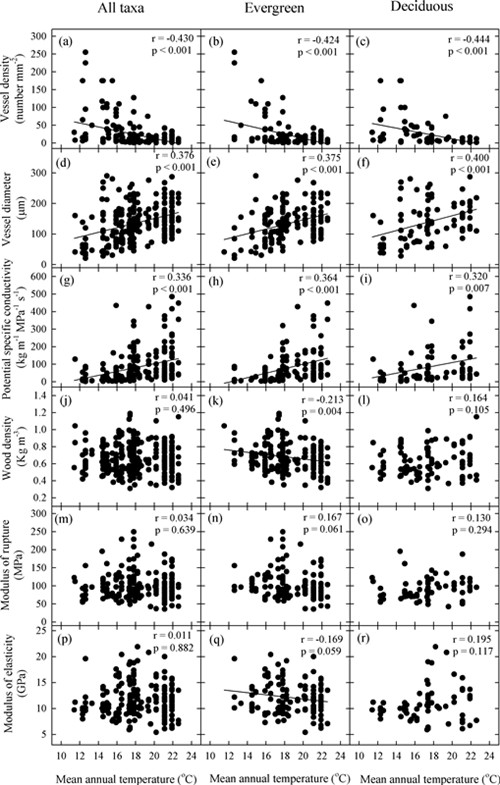Stem xylem structure of a tree is strongly related to hydraulic efficiency, mechanical strength and resistance to embolism. It is hypothesized that there is a “trade-off triangle” among those three traits of xylem. Meanwhile, both water availability and air temperature can affect the development of xylem structure, which in turn influences the water supply and photosynthetic gas exchange in trees. Therefore, understanding the influences of climatic factors on hydraulic efficiency and mechanical strength in trees and the “trade-off” among xylem traits are essential for understanding xylem functional diversity and the ecological strategy of trees.
Professor ZHANG Shibao ,from Kunming Institute of Botany, and the researchers from Guangxi University, and Xishuangbanna Tropical Botanical Garden, conducted a study on the xylem traits, potential hydraulic efficiency, mechanical strength of 316 angiosperm trees in Yunnan, and their correlations with climatic factors. The results showed that the magnitudes of variation were greater for vessel traits (vessel density, vessel size, and potential hydraulic efficiency) than for wood density and mechanical properties of these trees, and stem hydraulic traits are independent of mechanical properties. Values for vessel diameter and potential hydraulic conductivity increased with mean annual temperature in both evergreen and deciduous trees, but they were significantly correlated with the aridity index in evergreen species only. Both wood density and modulus of rupture were significantly correlated with mean annual temperature only in evergreen trees. Modulus of rupture decreased with increasing aridity index in the evergreens, but not in deciduous trees. These findings indicated that xylem development is more sensitive to environmental changes in evergreens than in deciduous trees, and no trade-off exists between xylem conductive efficiency and strength. This absence of a link is explained because angiosperms have xylem tissue that specifically functions in either mechanical strength or water transport. The results have important implications for predicting the processes and services of forest ecosystems, and the responses of evergreen and deciduous trees to environmental change.
This work “Potential hydraulic efficiency in angiosperm trees increases with growth-site temperature but has no trade-off with mechanical strength” has been published in Global Ecology and Biogeography 2013, 22 (8): 971–981 (Top 1 journal in Geography Physical, Impact factor 7.223).

Figure 1 Xylem structures of four angiosperm trees

Figure 2 Correlations of mean annual temperature with vessel traits and xylem mechanical properties for all taxa, evergreen species, and deciduous species.




